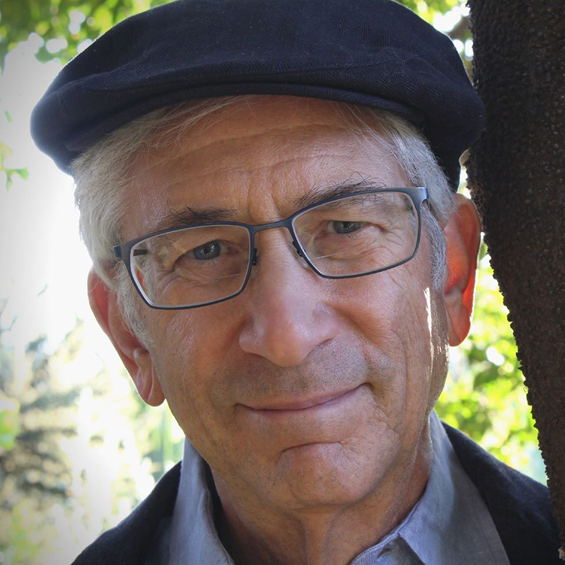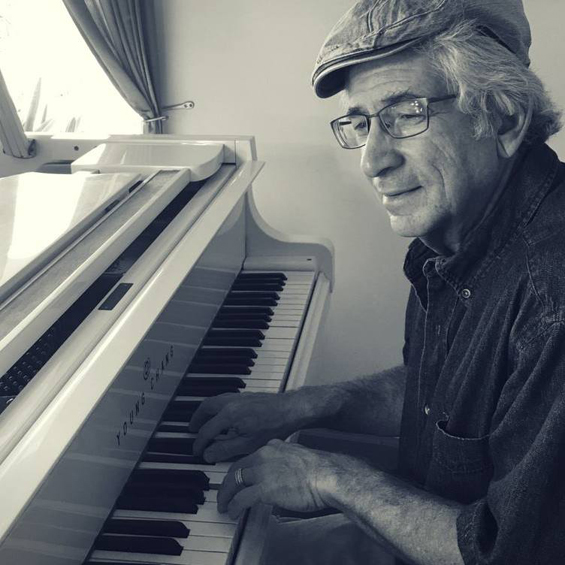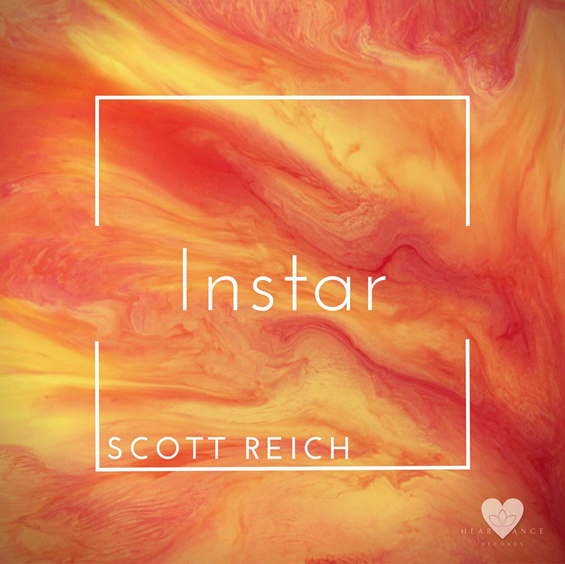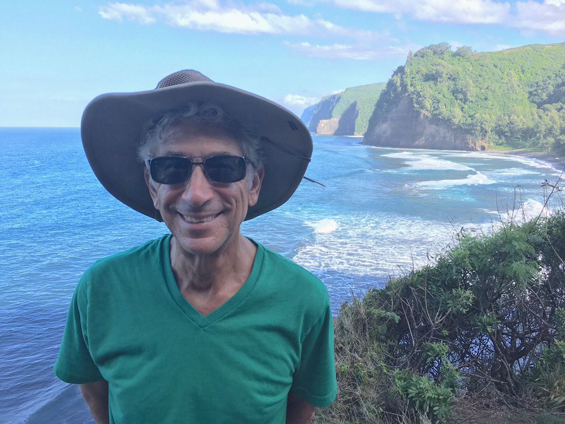

FIVE QUESTIONS WITH SCOTT REICH
Scott Reich, whose full-length Instar has just been released by Heart Dance Records (reviewed here), came to his current focus on New Age and ambient-electronic production circuitously. His father, Lenny, was a jazz trumpeter who passed his love for the music on to his young son, who began playing drums and eventually studied at Berklee College of Music and with jazz great drummer Max Roach. At Amherst College, Reich first double-majored in Pre-Med and Music Composition before focusing on the latter and earning his doctorate at the University of Michigan; during that Ann Arbor stay, his discovery of electronic music production opened up a world of possibilities that would later be critical to his creative approach. A twelve-year stay in Hawaii also proved pivotal, with exposure to the beauty of Kona's natural environment having a transformative effect. Newly inspired by said exposure, Reich reapplied himself to music-making, now treating it as a vessel for peace, positivity, and healing. Though he now calls San Diego home, Reich views his music as essentially homeless, saying, “Its real home is in your heart, should you choose to accept it.” textura had an opportunity to talk with the composer recently about his new album and general philosophy, and we're indebted to him for sharing his thoughts so generously with us.
1. How would you articulate the fundamental message of Instar, and how specifically does its musical content and style align with your interest in wellness and healing, as well as positive values such as peace and harmony?
The word Instar might seem to refer to a kind of bright light within; in fact, it's a biological term that refers to the stage of life leading up to a metamorphosis. Organisms undergo metamorphosis when their current forms can no longer contain what they are about to become. This happens to all of us, sooner or later. I feel that our world is in such a stage now, that we are rapidly approaching a period of radical change that will also require of us a massive transformation. That process is an accrual of all of our individual stories, and the music on Instar tries to give expression to some of these stories of emerging light, emerging change.
We have the strength, the inspiration, the courage, and creativity to succeed, to bring our world to the next stage in peace. But all of that resides jointly within us. What I mean is that no one person has all that it takes to move the world. But each of us has something important—critically important—inside of us that is needed. So, it is a two-step process. The first step is going deep within to find and retrieve the precious treasure that we have, even if it is hidden or buried. Then, once we bring this to the surface, it can join forces with these beautiful aspects that others have been able to realize. Then the Instar will be complete and the metamorphosis will begin.
2. Though the release credits you as the sole performer on Instar, I'm wondering how you achieved such a glorious orchestral sound on settings such as “Earth and Sky, Light and Love” and “His Final Test.” If the gear you used to produce the material was solely electronic, the results impress for sounding so remarkably natural. To clarify, then, was a mix of electronic and acoustic instruments used to create the album material or was it all electronically produced?
Instar, except for my voice on "Purify Time," is purely ‘electronic' or digital. (In fact, many of the sounds on Instar did originate from a person playing an instrument that was then programmed into a sampler, which allows me to ‘play' the instrument.) But whether the sound source is a live performance or not, the final recordings we listen to these days are a stream of digital signals, in any case. So there is no reason that digitally created or processed sounds would need to sound out of place. In fact, they really are the ones native to the medium.
But all of these are just the palettes of colour, the raw materials of the musical painting. To a person like me, these are extremely seductive. But to be useful, they need to be shaped, textured and balanced to express something.

3. Some might refer to the music on Instar as New Age, a label that carries with it all kinds of history. Are you comfortable with having your music described with that label or is there another you prefer (if one at all)?
This, like many of your thoughtful questions, is deceptively deep. I am not entirely comfortable with music genre labels generally. I know that there is a sort of hard-wired need that we humans have for categorization and codification. This is not bad, but when applied out of habit it usually stands as a barrier between us and the actual experience.
Rilke has something wonderful to say about this. To paraphrase, he says, “Be patient toward all that is unsolved in your heart and try to love the questions themselves… Do not now seek the answers, which cannot be given you because you would not be able to live them. And the point is, to live everything.” The converse is that when we think we have figured something out, when we have categorized it, we stop experiencing it. Isn't that, at its most fundamental level, what the civil rights movement was—and is—about? People saying, “You're not looking at me for what I am but for how you have categorized me. That hurts me, and it hurts you, too.” I know that my answer is probably getting far afield from what might be expected from your question. But I'm trying to be truthful with you.
In fact, I have no particular attraction to New Age as a term to describe a genre of music, partly because I think it has some baggage with it that might put some people off. I think that the ‘baggage' is the perception on the part of some that the term implies a way of thought and way of living that is intellectually not fully rigorous or honest in that it seeks answers that are simple and immediate, rather than true. The strength—and the weakness—of the so-called New Age movement is that it sometimes defines truth solely in terms of personal perception. The good part is that it emphasizes and values personal experience, a necessary first step. But we don't want to stop there.
David Whyte speaks about the “conversational nature of reality.” To me, life is defined by what he calls “life's fierce need to change you” and equally by the just as fierce need of your soul, your essence, to express itself in a way that changes the world. The result is that both get transformed. But that only happens if we “show up for the conversation.” The root truth is this: that both life and our essence need each other to evolve.
We can't do this if we are totally out of touch with our essence. And that is the beauty of the New Age movement: to help us get in touch with ourselves, with what we have to express inside. But for evolution to occur—both for us and for the world—we need to also be engaged with reality. Pico Iyer put it this way: “The point of gathering stillness is not to enrich the sanctuary or the mountaintop, but to bring that calm into the motion, the commotion, of the world.”
As to music genres, I'll sum it up this way. They are very useful when looking backward, to appreciate the history and development of music--after it has happened. But they are not useful in moving into the future which, by its nature, is undefined.

4. Certainly one of the more interesting details about your background is that you studied with the great jazz drummer Max Roach. What was the most valuable thing you took away from the experience?
Max Roach was more than a great drummer, he was a great spirit. He seemed to me to be instinctively creative, naturally always seeking new ways to experience this and express it in music. He was also a person who was not restricted by genres. If you listen to the recordings of his M'Boom Re:percussion Ensemble you can hear a great example of that. The music was true to his roots, including the jazz and African elements, but it didn't stop there. It truly went into uncharted territory, very unconventional, even by today's standards. I guess one of things I try to keep with me is his pioneering spirit.
5. On an album where there are many moments of beauty, one of the most powerful is “Purify Time.” The music is beautifully uplifting, but so too are the words (spoken by you, I'm guessing), the text taken from Bringing Heaven Down to Earth, Book 1 by Tzvi Freeman. I find this piece, in which music and text combine magnificently, to be incredibly moving and the message inspiring, especially when the text content is so genuine and sincere. How did this piece come into being, and what prompted the decision to include the text as a voiceover?
Thank you for your kind words. I'm not sure how “Purify Time” came together, honestly. I came across Tzvi Freeman's writings, was deeply moved and motivated, and wanted to get in touch with him to see if he might allow me to use some of his words with my music. I then found out that two people close to me, including my son-in-law, knew him well. So I was able to reach him, and it turned out that he was open to the idea. What happened after that is the part I can't explain, though I will try.
Most of my music, to me, is cinematic in nature. I have written film scores, primarily for productions of my daughter, Shantal Freedman, who is a film director and visual artist, and her husband, Andy Freedman, who is a screenwriter. Most of my music is not, however, literally a film score, but perhaps more like a soundtrack for some aspect of life. Like all good soundtracks, they are not there just to re-emphasize what is obviously taking place on the screen, but to support what is happening inside, on a deeper level that is felt, but unseen. So this music is there to support the spirit much more than the mind.
Anyway, as I tried to piece together the verses that conveyed the message of emerging light (so prevalent in Rabbi Freeman's work), a kind of progression started emerging. Somehow, this brought to mind part of a film score I had written for a short film entitled Visiting Hours (if you like, you can view that here). In any case, there was something about the underlying message in the music there that seemed to be not only supporting but also directing what was unfolding with the evolving dramatic narration I was creating from Tzvi Freeman's words. This was amazing in a way, almost unbelievable. The two situations were, on the face of it, quite different. Yet the music, with only slight alterations, fit both circumstances perfectly. It speaks to the universal nature of musical expression, that it somehow reaches a level in a person so deep that it equally supports many, very different external experiences. That's why I can listen to music from a time and from circumstances totally different from my own, and still feel like it speaks to what is going on in my heart right here, right now.
And you can see how the universal nature of musical expression points directly at the universal nature of human experience.

Bonus question: Not only is the recording inspiring, so too is the cumulative philosophy that emerges from the texts on the various pages of your site. If you had to distill that philosophy into a paragraph or two, how would you express it? And what ideally are you hoping your music can do for the listener?
We're in this together. We have before us both the promise and also the problems of our world. In other terminology, we have before us “the blessing and the curse.” We need to choose, collectively, to actually get to the promise, the blessing, that our world can be. This is a process that we are all involved with, and we are all needed to accomplish it. There are many obstacles, and quite a lot of them are within ourselves.
But there is also good news.
There is a teaching that there is the “blessing and the curse,” but there is also the blessing in the curse. What that means is that the obstacles-—all the things that are difficult for our spirit to overcome, including all the places where we have failed to do what we intended-—these very things can have the effect of super-charging our spirit.
This happens to people every day. A person suffers great failure, or great misfortune, or great adversity. But, at some point, something happens and the spirit rebels, unable to accept the status quo. It becomes unstoppable in its determination to find a way out, a way up, to higher ground, to express itself.
Do you remember what happened after 9/11? There were so many people, from all over the world, that wanted nothing more than to help others. This type of thing has happened over and over and over again. Great disasters have often brought our highest nature to the fore. We don't care about tribe, we don't care about recognition, we don't care about difficultly or discomfort. We just want to help, express love and compassion. But there is no reason that we need a horrible thing to happen to bring out the best in us! It is there all the time. And it can be accessible to us all the time.
In my own, very modest way, I hope that my music helps people come into touch with and embrace what is best in them. When they see how beautiful that really is, they will want to go deeper, and then they will want to bring it to the surface and share it. If I can help just one person do that, even in a small way, I am very happy.
There is a Chassidic teaching (that is, in a way, an early version of mindfulness) that we need to learn “the smallness of the great things, and the greatness of the small things.”
February 2019![]()